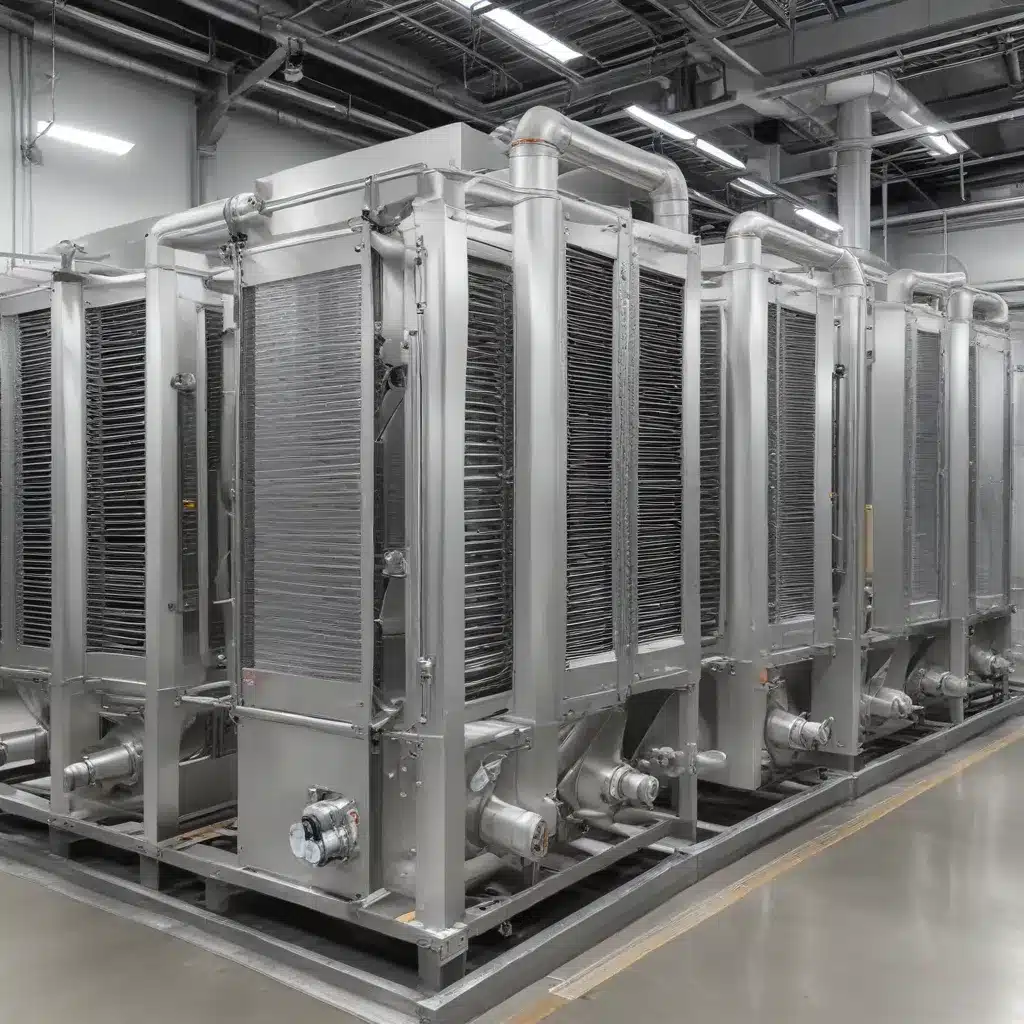
Advancing Thermal Solutions in the Food Processing Industry: Air-Cooled Heat Exchangers for Efficient Cooling and Temperature Control of Perishable Foods, Beverages, and Ingredients
The Critical Role of Air-Cooled Heat Exchangers in Preserving Food Quality and Safety
In the dynamic landscape of the food processing industry, maintaining precise temperature control and efficient cooling is paramount to preserving the quality, safety, and shelf life of perishable foods, beverages, and ingredients. Air-cooled heat exchangers have emerged as a cornerstone technology, enabling food processors to navigate the intricate challenges of thermal management with unparalleled reliability and energy efficiency.
Optimizing Cooling for Diverse Food Applications
Air-cooled heat exchangers find widespread application across the food processing sector, catering to the unique thermal requirements of a wide range of products and processes. From chilling dairy products and preserving the freshness of fruits and vegetables to regulating temperatures in beverage production and tempering ingredients for baked goods, these versatile systems play a vital role in maintaining the integrity and safety of perishable foods.
Dairy Processing
In the dairy industry, air-cooled heat exchangers are instrumental in rapidly cooling milk, cheese, and other dairy products immediately after processing. By efficiently removing heat and maintaining the optimal storage temperature, these systems help mitigate the growth of harmful microorganisms, extend shelf life, and preserve the sensory qualities that consumers demand.
Produce Handling and Storage
The delicate nature of fruits and vegetables requires careful temperature control to prevent premature spoilage and maintain nutritional value. Air-cooled heat exchangers play a critical role in the post-harvest handling and storage of produce, ensuring that these perishable items are cooled to the appropriate temperature and kept within a narrow temperature range throughout the supply chain.
Beverage Production
From chilling the wort in brewery operations to regulating the temperature of fruit juices and other beverages, air-cooled heat exchangers are essential for managing the thermal aspects of various beverage production processes. By precisely controlling temperatures, these systems help ensure product quality, consistency, and safety.
Ingredient Tempering
In the preparation of baked goods and other food products, air-cooled heat exchangers are often employed to temper ingredients, such as chocolate, fats, and oils, to the desired temperature and viscosity. This precise temperature control is crucial for ensuring the optimal functionality and performance of these ingredients during further processing and formulation.
Enhancing Efficiency and Sustainability
Beyond their versatility in addressing diverse food processing needs, air-cooled heat exchangers offer a host of benefits that contribute to enhanced efficiency and sustainability in the industry.
Energy-Efficient Cooling
Compared to their water-cooled counterparts, air-cooled heat exchangers are inherently more energy-efficient, as they do not require the additional energy-intensive step of cooling the water in a cooling tower or chiller. This translates to significant cost savings and a reduced carbon footprint for food processors, aligning with the industry’s growing focus on sustainable operations.
Simplified Installation and Maintenance
The self-contained nature of air-cooled heat exchangers, coupled with their straightforward installation and minimal infrastructure requirements, make them an attractive choice for food processors. Without the need for a dedicated water supply or cooling tower, these systems can be easily integrated into existing facilities, streamlining the implementation process and reducing overall investment costs.
Reliable Performance in Diverse Environments
Air-cooled heat exchangers are designed to withstand the challenges posed by various environmental conditions, making them well-suited for a wide range of food processing applications. Whether installed indoors or outdoors, these systems can operate effectively in diverse climates, ensuring consistent and reliable cooling performance even in the face of fluctuating ambient temperatures or humidity levels.
Unlocking the Full Potential of Air-Cooled Heat Exchangers
To maximize the benefits of air-cooled heat exchangers in the food processing industry, it is essential to adopt a comprehensive approach to their design, installation, and maintenance. By collaborating with experienced thermal management experts, food processors can ensure that their air-cooled heat exchanger systems are optimally configured to meet the unique demands of their operations, delivering unparalleled efficiency, reliability, and longevity.
Tailored System Design
The design of air-cooled heat exchangers should be customized to the specific cooling requirements of the food processing application, taking into account factors such as the heat load, ambient conditions, and the unique characteristics of the products or processes being cooled. By working closely with experts, food processors can ensure that their air-cooled heat exchanger systems are precisely engineered to provide the necessary cooling capacity and performance.
Proactive Maintenance and Optimization
Maintaining the optimal performance of air-cooled heat exchangers requires a proactive approach to maintenance and optimization. Regular inspections, cleaning, and preventive maintenance can help ensure that these systems continue to operate at peak efficiency, minimizing the risk of unexpected downtime and maximizing their lifespan. Additionally, ongoing monitoring and adjustments can help food processors adapt to changing conditions and further optimize the performance of their air-cooled heat exchanger systems.
Leveraging Technological Advancements
The field of air-cooled heat exchanger technology is continuously evolving, with the introduction of innovative materials, design features, and control systems. By staying informed about the latest advancements and collaborating with industry leaders, food processors can take advantage of these technological improvements to enhance the efficiency, reliability, and sustainability of their cooling systems.
By embracing the power of air-cooled heat exchangers and adopting a strategic approach to their deployment, food processors can unlock a new era of thermal management excellence, ensuring the quality, safety, and freshness of their products while contributing to a more sustainable future for the industry.
Conclusion
Air-cooled heat exchangers have emerged as a game-changing technology in the food processing industry, offering unparalleled efficiency, reliability, and versatility in maintaining precise temperature control across a wide range of applications. By harnessing the power of these innovative systems, food processors can elevate their operations, safeguard product quality and safety, and contribute to a more sustainable future for the industry.
To learn more about how air-cooled heat exchangers can transform your food processing operations, visit https://www.aircooledheatexchangers.net/.

